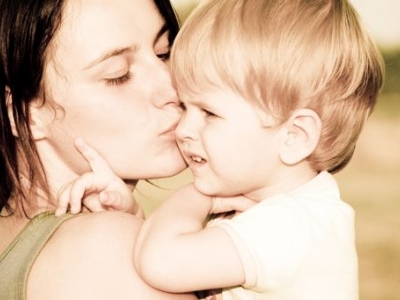
Teaching children about the power of words
A Christian parent reflects on what to tell kids about swearing, blaspheming, and appropriate language.
"You just said WHAT?!"
How many times have you thought (or said) this, in response to one of your tiny tots or tall teens letting rip with a potent swear word?
As parents, it's easy to react with horror and call down punishments when children use words we object to. But what's really going on when our kids swear or blaspheme? Who decides what is appropriate language, and what isn't? Here are a few thoughts to get you started.
Swearing (in moderation) can be helpful
In 2010, researchers made the amazing discovery that if a person is in pain, swearing actually has analgesic (pain-relieving) properties.
Before your naughty teenager uses this Nobel-prize-winning information against you, it is important to note that in the experiment, people who swore regularly in their normal life experienced little or no pain-relieving effect from swearing when in pain. The only people it served were those who saved the expletive for rare "special occasions".
I believe that it is right and normal — and even a God-given blessing — to be able to let out a verbally expressive word in appropriate circumstances, such as in times of intense pain.
In fact, very strong language even occurs occasionally in the Bible. Paul, for example, expresses the intensity of his emotion when he writes, “I have suffered the loss of all things and count them as skubala [dung / crap / s***] in order that I may gain Christ” (Philippians 3:8). Here, strong language is used not to express physical pain, but as a way of communicating Paul's unusual level of emotional intensity.
However, if we take swearing into the realm of normal, everyday life – instead of just using it in those extreme moments – it has two very serious effects.
First, as the research discovered, overuse stops the words from being effective when they are needed most. Second, people who swear frequently actually give themselves the impression that their everyday life is more miserable than it actually is. This can lead to a reduced sensation of happiness and pleasure. Two very good reasons for limiting the swearing!
The confusion around swearing
If swearing, used sparingly, has potential benefits, why do Christians often teach against it?
I've often heard parents forbidding "swearing" and "blaspheming" without having much of a reason for doing so. Sometimes this is combined with the hypocrisy of forbidding our children from doing it, but letting the words slip out ourselves when no-one is thought to be around!
The problem here could be that although we may have a reasonable understanding of what God says about our words, we're not quite sure why he says it. And because it feels good (e.g. relieving pain), we continue to do it. Such rules, made without solid reasons behind them, can lead to hypocrisy, both in your children (performing well only in front of you) and in you (performing well only in front of them)!
What does the Bible say about swearing?
Let's turn to what the Bible says about our words. The broadest biblical instructions about our words is that we are to use them to build up, not destroy:
Do not let any unwholesome talk come out of your mouths, but only what is helpful for building others up according to their needs, that it may benefit those who listen—Ephesians 4:29
This is the golden rule and motivation for using words - they should be wholesome, and helpful for building others up.
And so, rather than issuing a blanket ban on what you consider to be "swear words", why not chat with your kids about the impact of their words on others?
You might want to get the conversation started by talking about the different ways swear words are often used.
- Swearing or silly talk which refers to God or spiritual things: Using the name of God (or Jesus) in a trivial way is the essence of "taking the Lord's name in vain" (Exodus 20:7), and is prohibited in the Old Testament because of the seriousness of giving the impression that God, himself is unimportant. Other words take other very terrible spiritual realities and trivialise them, or associate beautiful spiritual realities with something negative.
- Swearing or silly talk which refers to sex or sex organs: These words associate something private, beautiful, exquisite and powerful with (usually) something negative or silly. It undermines the amazing sexual life given to humans by God, and can make others awkward by being forced to think about sex in a normal public setting.
- Words which are generally accepted to be impolite – including those that refer to bodily functions: These words can convey an attitude of disrespect to the listener, and can cause people to feel uncomfortable.
- Swear words directly aimed at a person: Verbally attacking someone is bad enough, but the use of a swear word makes the attack stronger, more personal, and more offensive.
Through discussing the effects of words with your children, you give them not an arbitrary rule, but a principle and a motivation to avoid swear words — and any words — which fail to build up and benefit the hearer.
So swearing can be good for you... and bad too. Where to next?
It's important to grasp that words are, in themselves, just neutral combinations of sounds. All words can be used with or without offensive meaning.
There's a famous joke about a Bible translator who goes off to a remote tribe, and learns the language from the people living around her. After several years, an educated local meets her and notices she is swearing like a trooper. "Don't you know that word is a swear word?" she asks.
"Really?" the missionary replies in embarrassment. "I just thought it meant 'very'!"
There are two morals of this story. First, when your child or teenager lets out a clanger in your presence, first take the time to gently ask if they know what it means! A little education may be all that is required.
Second, it is possible to choose a different combination of sounds and invest them with the same emotional intensity as a swear word. It might sound a bit corny to your cool teens, but little kids love making up fake swear words. Even teenagers can probably find some kind of swear word which doesn't have an offensive or unhelpful meaning, to pull out in the rare crisis moments. Work out as a family which words you all agree are acceptable and appropriate, and in which circumstances.
Finally, show grace when one of your family members uncharacteristically uses an unacceptable word. It probably means they are in a lot of pain (physical or psychological), and don’t need a lecture or punishment, but encouragement and special care as "first aid".
So, in summary, appropriate language for kids (and parents!) means taking care of how your words affect your hearers (and yourself), treating God and his name with respect, and enjoying the healthy, natural pain relief which comes from an extra-expressive word or two, in times of intense pain or emotion.
For more articles from Growing Faith, subscribe to our monthly e-newsletter.
To hear about the latest books and resources from Youthworks Media, subscribe here.







